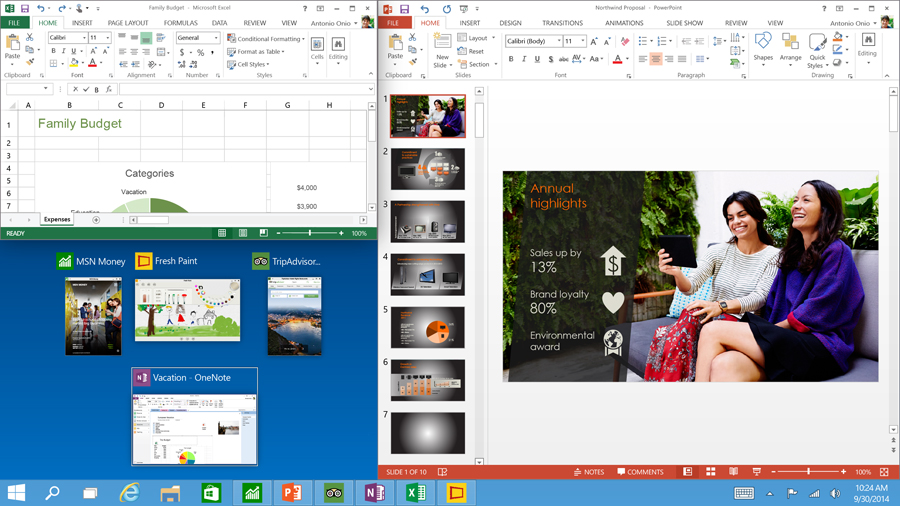Windows 10 is a balancing act
More than meets the discerning eye?

Sign up for breaking news, reviews, opinion, top tech deals, and more.
You are now subscribed
Your newsletter sign-up was successful
Call it an unveiling. Call it a preview. Call it walking across a threshold. Call it Microsoft trying really, really hard to say that Windows is fresh and new – and yet familiar enough for business users who've been clinging to Windows XP and 7 but want some of the advantages of Windows 8.
The event yesterday was all about the conversation Microsoft has started having with its business customers in an attempt to sell Windows 7 users on Windows 8 features and benefits.
It's trying to do so by backing away from the extreme Windows 8 touch interface that businesses failed to adopt and the consumerisation-before-everything approach of logging in only with Microsoft accounts. In Microsoft arithmetic, that rather complex equation adds up to ten.
The first look we got at Windows 10 didn't necessarily fit the trendy San Francisco setting; a brick-lined theatre in the middle of a fast-commercializing area of Market Street where pot-smoking chess players and adult theatres are being replaced by cloud startups.
- Is the new OS any good? Read our hands on Windows 10 review to find out
Consumer connundrum
But the down to earth practicality of the approach Terry Myerson and Joe Belfiore bring to Microsoft's attempt to bridge the worlds of desktop, touch, IT, business users and consumers isn't entirely out of place either. Change is hard. "Users are saying 'don't move my cheese'," Myerson commented to us; "but they're also saying 'give me more cheese, give me better cheese'."
The outspoken reaction to the Windows 8 interface, which was reminiscent of the way people who had never used Windows Vista still complained loudly about it, was hard cheese for Microsoft. When they rejected the modern interface, businesses also rejected the benefits of apps that don't have Trojans tucked inside them, laptops with extra hours of battery life and a file system that automatically encrypts your files.
Windows 10 has those advantages and more, including a sophisticated containerisation system that separates personal and business files in a way that's becoming common on smartphones; think Samsung Knox or BlackBerry Balance, but without the confusion of moving from one environment to another.
Sign up for breaking news, reviews, opinion, top tech deals, and more.
Windows 10 doesn't want to be confusing, or challenging. What the technical preview shows is a much less adventurous, less forward-looking change than Windows 8. If you found the transitions from the Start screen to the desktop jarring, it's a slightly less schizophrenic system where the keyboard shortcuts you know make sense.
That's regardless of whether you're pasting a script into the command prompt or tabbing between modern and desktop apps and the mouse lets you move all of your apps or whether you install them from a DVD or stream them from the Store.
Tricky moves
It would be easy to joke about Microsoft turning back to the command line after problems with the interface people still call Metro, but recognising that all of the rich heritage of Windows is useful to someone, somewhere is a good thing.
And with the Insider program letting users give feedback instantly as they try out features, Microsoft has the chance to show how carefully it's listening because monthly updates may soon become the norm.
The question is whether, as well as stepping back and integrating the new platform into the familiar desktop, Microsoft can carry on moving forward with Windows 10 as well.
When Windows 8 came out, less than 5% of the PCs you would see in a store had touchscreens. Now it's more like 40% (ed: although that market has been shrinking), but the Windows 10 that Microsoft unveiled today isn't counting on that change, or on the familiarity of touch people have from smartphones and tablets.
It's designed for the businesses who have had to finally get off Windows XP, who have mostly picked Windows 7 (unless they're specifically choosing tablets and Windows 8.1) and who need to be coaxed onto something newer. Microsoft doesn't want to have a "Windows XP bis" problem, getting them off Windows 7 in another decade's time.
Mary (Twitter, Google+, website) started her career at Future Publishing, saw the AOL meltdown first hand the first time around when she ran the AOL UK computing channel, and she's been a freelance tech writer for over a decade. She's used every version of Windows and Office released, and every smartphone too, but she's still looking for the perfect tablet. Yes, she really does have USB earrings.